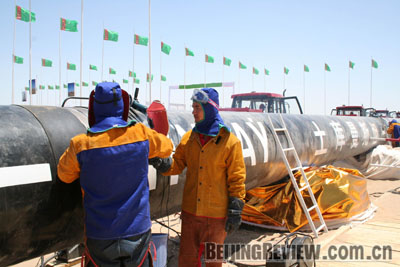|

ENERGY PARTNERS: Chinese and Turkmen workers work on the
China-Turkmenistan gas pipeline at the foundation laying ceremony of
a gas processing plant on the right bank of the Amu Darya River on June 27
SCO member states will continue to address the threats of terrorism and drugs by establishing extensive partnerships with other countries and regional organizations, the declaration said.
The SCO's adoption of the Dialogue Partnership Protocol at the Dushanbe summit was an important step in terms of its organizational development, said Ji Zhiye, Vice President of the China Institutes of Contemporary International Relations.
The six-member organization currently has four observers: Mongolia, Pakistan, India and Iran. The protocol would help enhance the SCO's influence and increase its dialogue with other countries and regions, he said.
Countries and regional organizations that recognize SCO's principles and are interested in cooperating with the SCO can all seek dialogue partnerships with the organization, said Chen. She said the protocol not only lays the legal groundwork for the SCO to reach out to other countries and regions, but is also evidence that the SCO is an open organization.
With regard to the recent war in South Ossetia, a breakaway republic in Georgia, the SCO member states expressed their "deep concern" and called on the parties involved to "resolve existing problems peacefully through dialogue, strive for reconciliation and push for negotiations." They also expressed their support for Russia's role in promoting peace and cooperation in the region.
Although South Ossetia does not fall under the SCO's mandate geographically, the issue bears on SCO members' interests, especially Russia's, said Ji. The declaration shows SCO members' understanding of Russia's role in regional peacekeeping, a collective stance that is of great importance to the country, he said.
Mutual benefits
The Chinese Government policy is to develop Sino-Tajik relations of "lasting friendship, equality and trust, mutual benefit and win-win outcome," Hu said while meeting with his Tajik counterpart Emomali Rakhmon in Dushanbe. The two countries agreed to expand collaboration in the fields of transportation, hydropower, mining and agriculture. They also vowed to deepen security cooperation to combat separatist, terrorist and extremist forces, including the "East Turkestan" independence movement.
In the Turkmen capital of Ashgabat, Turkmen President Gurbanguly Berdymukha-medov told Hu that China is one of his country's most important and reliable partners. In the future, the two countries will work even closer in infrastructure construction, energy and law enforcement and security. Berdymukhamedov also awarded Hu a "Niyazov" medal, Turkmenistan's highest honor for foreign leaders.
Hu's visit gave new impetus to China's relations with Tajikistan and Turkmenistan, Chen said. It indicated the importance China attaches to developing comprehensive relations with Central Asian nations. As they seek economic development, these nations are eager to have China's investment and assistance, Chen said.
| 